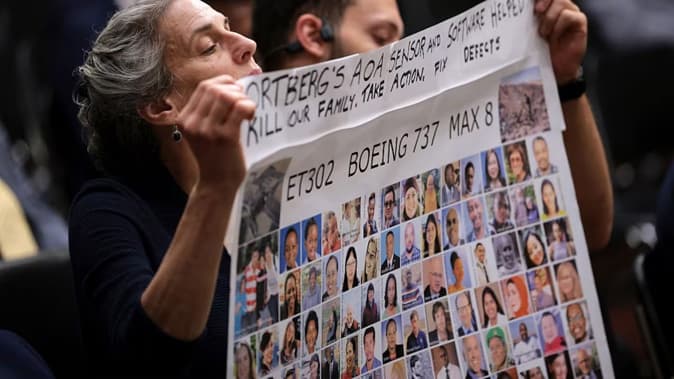We're loading the full news article for you. This includes the article content, images, author information, and related articles.
More than six years after the Nairobi-bound flight crashed killing 157 people, including 32 Kenyans, a landmark US trial begins, seeking to hold the aviation giant accountable for the 732 MAX tragedy.

NAIROBI – The first civil trial over the catastrophic 2019 crash of Ethiopian Airlines Flight 302 began in a Chicago federal court on Monday, November 3, 2025, a watershed moment for families of the 157 victims, including a significant Kenyan contingent, who have waited over six years for public accountability. The proceedings, which commenced with jury selection, mark the first time Boeing will face a jury in a civil case related to the disaster that led to the worldwide grounding of its 737 MAX fleet.
The trial consolidates the cases of several victims' families, with the initial proceedings focusing on claims brought by the relatives of a 28-year-old Kenyan woman, Mercy Ndivo, and a 36-year-old Indian woman, Shikha Garg. The flight, which was destined for Nairobi’s Jomo Kenyatta International Airport, crashed just six minutes after takeoff from Addis Ababa on Sunday, March 10, 2019, leaving no survivors.
The tragedy deeply scarred Kenya, which lost 32 of its citizens, the largest number from any single country. The victims included academics, humanitarian workers, business leaders, and the family of a prominent Kenyan football official, Hussein Swaleh. Many were en route to a United Nations Environment Assembly in Nairobi, highlighting the global nature of the loss felt acutely within Kenya.
At the center of the trial is Boeing’s controversial Maneuvering Characteristics Augmentation System (MCAS). This automated flight control software, designed to compensate for the 737 MAX's larger, repositioned engines, was implicated as a primary cause in both the Ethiopian Airlines crash and the Lion Air Flight 610 crash in Indonesia five months prior, which killed 189 people. In both incidents, erroneous data from a single angle-of-attack sensor triggered the MCAS, repeatedly forcing the planes' noses down as the pilots struggled unsuccessfully to regain control.
In a significant legal filing in November 2021, Boeing accepted full responsibility for the ET 302 crash, admitting it had “produced an airplane that had an unsafe condition.” This admission paved the way for families to seek compensatory damages under US law and prevented Boeing from blaming the pilots or other parties. However, the agreement stipulated that plaintiffs would not seek punitive damages. This trial will therefore focus on determining the appropriate level of compensation for the victims' suffering and their families' loss.
The journey to this trial has been protracted. While Boeing has settled the vast majority of lawsuits stemming from the two crashes, several families have held out, seeking a public hearing of the evidence. On at least four previous occasions, scheduled trials were averted by last-minute settlements.
The legal fallout for Boeing has been immense. In January 2021, the company entered into a $2.5 billion deferred prosecution agreement (DPA) with the U.S. Department of Justice to resolve a criminal charge of conspiracy to defraud the Federal Aviation Administration (FAA). The settlement included a $500 million fund to compensate the families of all 346 victims from both crashes. However, in May 2024, the Justice Department determined that Boeing had breached the terms of the DPA by failing to implement an adequate compliance and ethics program, exposing the company to potential criminal prosecution.
The crash of ET 302 triggered an unprecedented global response, leading to the grounding of the entire Boeing 737 MAX fleet for 20 months while the company redesigned the MCAS software and updated pilot training protocols. The aircraft has since been recertified and returned to service globally.
For the Kenyan families, the start of the trial is a painful but necessary step. The emotional toll was evident in October 2019 when the remains of 28 Kenyan victims were repatriated to a somber reception at JKIA. While financial settlements have been reached with many, including payments of approximately $1.45 million per family from the DOJ's compensation fund, the pursuit of a public trial underscores a demand for non-monetary justice and a full accounting of the failures that led to the disaster. The proceedings in Chicago, under U.S. District Judge Jorge Alonso, are expected to last approximately ten days and will be closely watched in Kenya and around the world as a critical test of corporate accountability in the aviation industry.
Keep the conversation in one place—threads here stay linked to the story and in the forums.
Sign in to start a discussion
Start a conversation about this story and keep it linked here.
Other hot threads
E-sports and Gaming Community in Kenya
Active 9 months ago
The Role of Technology in Modern Agriculture (AgriTech)
Active 9 months ago
Popular Recreational Activities Across Counties
Active 9 months ago
Investing in Youth Sports Development Programs
Active 9 months ago
Key figures and persons of interest featured in this article